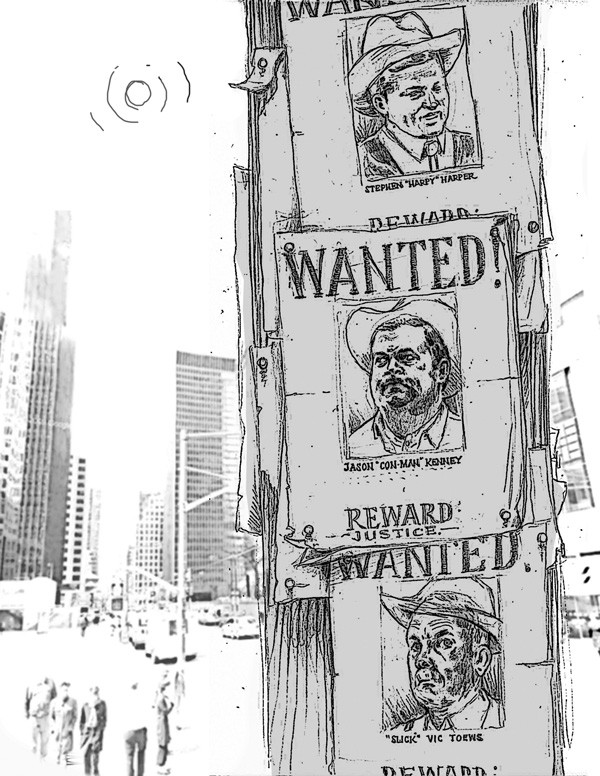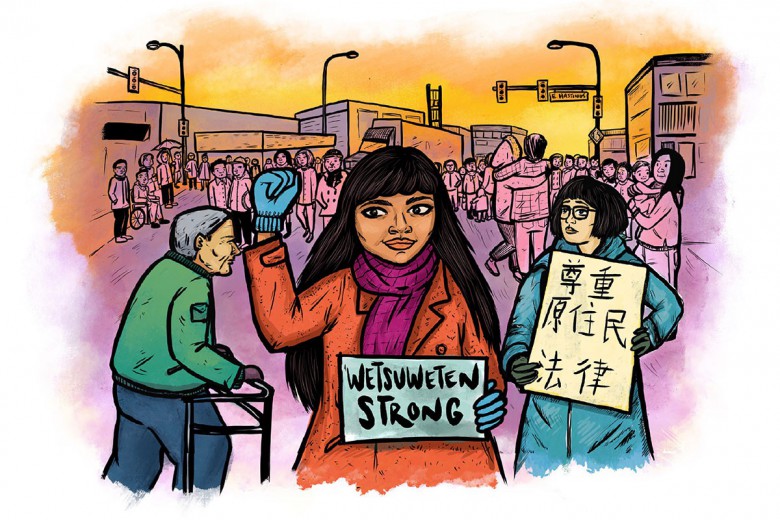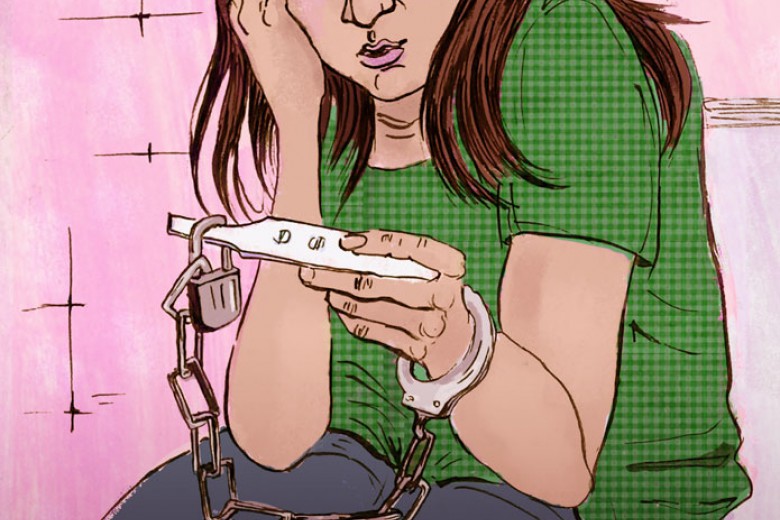
“Wanted” posters are hard to come by these days outside of old westerns, but last July, ministers Jason Kenney and Vic Toews released a “most-wanted” list of 30 people the Immigration and Refugee Board (IRB) had deemed inadmissible to Canada. Kenney and Toews announced that these migrants had committed war crimes, and asked for the public’s help in locating and deporting them. The list came complete with mug shots and a 1-888 tip line for civilians to call with sightings, but no details about the basis or the seriousness of the government’s accusations.
Within a week, the Canadian Border Services Agency (CBSA) had apprehended five of the individuals. By April 2012, a total of 16 people had been deported, and the Conservatives had expanded the list’s parameters to include migrants accused of breaking and entering. Evidently, the list has become a permanent and ongoing means of enlisting public support in the burgeoning business of deportation.
If there is indeed a need for civilian vigilance, it must be against the Conservatives’ off-loading of policing of racialized communities onto a citizenry already bombarded with anti-migrant fearmongering, and soliciting public support in sustaining a system of deportation that is both ethically and legally suspect.
The ‘poppycock’ of the people
The Conservatives use polarizing rhetoric to demonize leftists on all manner of issues, from environmentalism to Internet privacy, and to bolster the Conservative image of the mainstream citizen as someone who mocks all remotely progressive perspectives as fringe.
This was true, for instance, when the Canadian Conference of Catholic Bishops criticized a previous iteration of Bill C-31, Protecting Canada’s Immigration System Act, which mandates the unreviewable detention for at least one year of refugees who use “irregular means” to flee persecution, including minors. Kenney, who identifies as staunchly Catholic, dismissed the bishops’ concerns as the work of “ideological bureaucrats … producing political letters signed by pastors who may not have specialized knowledge in certain areas of policy.” Yet the fact that IRB adjudicators do not have specialized knowledge in criminal policy has not stopped Kenney from claiming they can identify war criminals.
When the CBC did not immediately publicize the list, Toews publicly berated them. He insisted that “the state broadcaster” should be working more closely with law-enforcement agencies. When Amnesty International issued its critique of the list, Kenney ridiculed their letter as “poppycock” and “self-congratulatory moral preening,” which he contrasted with “the common sense of the people and the law.” However, what he calls the public’s common sense is nothing other than the xenophobia he seeks to normalize. The British Columbia Civil Liberties Association (BCCLA) cautioned that the list would “reinforce existing xenophobia, hurting all newcomers, particularly in the context of repeated recent government messaging associating refugees and immigrants with criminality, fraud and abuse.”
Our brother’s keeper
The BCCLA’s warning was borne out by the government’s success in getting at least some citizens to moonlight as spies without, as Toronto Star columnist Carol Goar put it, “questioning the morality of turning in their neighbours, customers and compatriots, let alone any stranger who bears a likeness to the often grainy images on the website.”
The National Post, which described the Conservatives’ turn to vigilante anti-immigrant tracking as “a complete reversal of longstanding government policy,” published excerpts from emails sent to Toews, and later released under an access to information request, applauding the list. One enthusiast wrote that these “actions should have started long ago,” and suggested Canada move faster on deporting “Nazi war criminals.” Meanwhile, Vancouver’s own homegrown neo-Nazi criminals escaped the interest of authorities for years. Another letter only asked, “Is there a financial reward for helping capture those war criminals?” The thought of people turning strangers in for money is disheartening, especially so when we remember that serial killer Robert Pickton remained free for years, despite all the information about him provided to police by the women he eventually murdered and by their friends and families.
Of course, there is a common thread here. Most of Pickton’s victims were Aboriginal. Everyone who was attacked (and in one case lit on fire) by the Vancouver branch of the neo-Nazi group Blood and Honour was racialized. These are not isolated moments of violence. They are the inevitable effects of a systemic racism in which the state disregards the violence regularly visited upon Indigenous and racialized communities while simultaneously targeting them for disproportionate surveillance.
Kenney’s response to concerns about the list giving fodder to racists provides an instructive example of how determinedly he depicts racialized communities as guileless pawns: “I think that’s patently ridiculous. To the contrary, we’ve received nothing but a phenomenally positive response from new Canadians in general. And the evidence of that is most of the useful tips coming from the public are generated from cultural communities in which these people have been situated in Canada. So we thank members of those communities for their cooperation. New Canadians understand what perhaps some of the left-wing NGOs don’t.”
In pitting “new Canadians” against “left-wing NGOs,” Kenney perpetuates racist stereotypes of immigrant com-munities as inherently conservative. This is especially insulting given how actively Kenney seeks the mass deportations of immigrants to places of documented war crimes and torture, like Sri Lanka and Mexico.
Yet migrant rights organizations in three different cities successfully coordinated a campaign in which “the public” enthusiastically flooded the tip line with information on sightings of Kenney and Toews. The CBSA has provided no comment on how many of the thousands of phone calls they say they received in response to their call for tips were from these pranksters with a cause.
Fighting torture with torture
Under domestic and international law, Canada cannot deport people to countries where they would be at serious risk of grave human rights violations, including torture, the death penalty, and extrajudicial execution. As Amnesty International put it, “sending an accused torturer off to be tortured does not help eradicate torture.” The BCCLA pointed out: “The label ‘suspected war criminals’ could potentially put people at increased risk if deported to their home country.” Thus, as leading refugee lawyer Lorne Waldman noted: “If the purpose of this policy is to deport such people, then publicizing it is counterproductive.”
In October, Waldman stated the list had already led to death threats against one migrant. By December, a federal official concluded that the publicity from the list had put one migrant, Arshad Muhammad, at risk of torture in Pakistan where his family had begun to receive death threats after his mug shot made news there, consequently putting his deportation in question. All of this happened even after Kenney’s declaration in August that the migrants were en-titled to pre-removal risk assessments, a standard procedure available to all rejected refugee claimants.
This January, an Access to Information request revealed that, even before the list went public, the CBSA had been warned it could prove counterproductive. The fact that the government still went on to defend the list’s circulation as “integral in our efforts to locate and remove” migrants indicates that the Conservatives’ zeal for deporting people is trumped only by their commitment to fearmongering.
Why have courts when you’ve got the IRB?
The “most-wanted” list worked only because the government knew it could confidently rely on the public’s ignorance of the differences between Canada’s immigration and criminal systems. It has exploited that ignorance to undermine the rule of law and the presumption of innocence, values that Kenney otherwise likes to celebrate as distinctly Canadian.
In a personal letter lambasting Amnesty International, Kenney maintained that “the Immigration and Refugee Board (IRB) does not make allegations or accusations – it makes formal findings of fact.” But as Waldman has explained, IRB decisions are immigration findings, not determinations of criminal guilt. Determining criminal guilt is the exclusive domain of criminal law, which has a higher burden of proof than the IRB. The IRB is not a court; it is an administrative tribunal. Its adjudicators are not judges; they are government-appointed decision makers.
Moreover, as the BCCLA stated, Canada’s immigration laws have “very broad inadmissibility provisions … which go far beyond people who have actually committed crimes to people who only have an indirect association with crimes.”
For instance, the fifth person from the list to be arrested, Abraham Bahaty Bayavuge, has denied any wrongdoing, saying he was only a computer technician. Kenney’s rejoinder was very vague: “My understanding is that [Bayavuge] was involved in a former Congolese government that was gravely implicated in such crimes.”
Similarly, between 2009-2011 the Conservatives labelled Tamil asylum seekers “criminals” and “terrorists” for alleged associations with the Liberation Tigers of Tamil Eelam (LTTE), which had been at war with the Sri Lankan government. Lawyers have stressed that the LTTE forced many civilians to provide menial services, such as digging ditches, against their will. Nevertheless, the government deported them to Sri Lanka despite knowledge of rampant war crimes there.
In any event, while the principles of fair trial are fundamental to both international and domestic law, Kenney has derided any interest in following these rules as an “ideological process obsession.” Instead, he has characterized the government’s flouting of these checks and balances as proof that Conservatives are exceeding their international obligations.
Why prosecute when you can deport?
While more than willing to accuse migrants of being war criminals, the Conservatives have refused to lay criminal charges and pursue trials that could ascertain any of the migrants’ guilt or innocence, despite being empowered and, in some instances, obliged under both domestic and international law to investigate and prosecute people accused of committing war crimes elsewhere. Accordingly, the family of one of the migrants, Khalil Abdul Khalil, has stated it will be filing a defamation suit against the CBSA.
But why would a government infamous for “tough on crime” rhetoric not want to bring a war criminal to justice? After all, Kenney maintains the migrants “are not merely ‘accused’ or ‘alleged’ human rights violators.”
As both Amnesty International and the BCCLA have noted, there is no assurance that once deported these individuals will face any investigations in their return countries. Apparently this is so with Cristobal Gonzalez-Ramirez. He was on the list and deported to Honduras, where a local human rights group is concerned that he may be able to avoid responsibility for crimes he allegedly committed there. Similarly, the Peruvian embassy in Ottawa said they only learned about Manuel de la Torre Herrera and Henry Pantoja Carbonel through the media and that as far as they know, “these two men are not subjects of any investigation or criminal procedure in Peru.”
Kenney has responded that the government “is not obligated to conduct full-blown trials, at the cost of millions of taxpayer dollars, to prosecute every inadmissible individual for crimes committed in distant countries, often decades ago.” Yet the Conservative government has had no qualms about pushing through omnibus crime Bill C-10, which will cost taxpayers millions of dollars at a time when crime rates are at an all-time low.
Kenney claims his “preeminent goal … is defending Canada.” Yet he has provided no evidence that these people, accused of crimes from “distant countries, often decades ago,” pose any threat to Canada’s safety.
Of course, the real value of these deportations is their air of finality. They score more political points in these anti-immigrant times than do trials, which generally allow for appeals. Still, the government could have easily deported these migrants without labelling them war criminals. That, however, would have denied the government the tough-on-crime capital it so desperately seeks.
Within a month of its initial release, the government expanded the list to include people wanted for “serious criminality.” The CBSA has yet to define serious criminality, but judging from the information they do provide, even breaking and entering warrants the label. There are now 40 people on the list, colour-coded by apprehension, deportation, and newness of listing.
Many of the descriptions of the migrants are impenetrably vague. They read, in their entirety: “This individual is the subject of an active Canada-wide warrant for removal because he is inadmissible to Canada. This individual has been convicted of an offence outside of Canada that, if committed in Canada, would constitute a Canadian offence.” What the CBSA conveniently leaves out is that convictions in some countries do not necessarily constitute legal findings of guilt in Canada, as not all countries provide for the same due process in criminal proceedings as Canada.
While the “most-wanted” list is ostensibly intended to bring perpetrators of violence to justice, we must remember that this list is being deployed against a backdrop of blatant state hypocrisies. Besides Kenney’s drive to deport even non-war criminals to places of widespread violence, Toews has authorized the Canadian Security Intelligence Service to release information to foreign agencies, despite the risk that this will lead (as it already has) to the torture of Canadian citizens.
What we learn from the Conservatives’ wilful denial of the public’s intelligence and humanity is that what is at stake is not so much what happens at borders as what happens within them. Though the Conservatives are obsessed with keeping most people out of Canada, they are much more interested in ensuring that we all live here in a state of perpetual fear of one another. In opposing their throwbacks to a cowboy age, ours is a commitment to meaningful cross-community trust and solidarity.


_780_520_90_s_c1.jpg)


